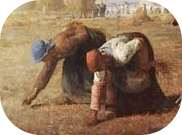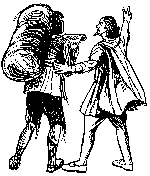
GLEANINGS IN THE PSALMS
(Psalm 66)
Division. Verses 1,2,3,4 are a kind of introductory hymn, calling upon all nations to praise God, and indicating to them the words of a suitable song. Verses 5,6,7, invite the beholder to “Come and see” the works of the Lord, pointing attention to the Red Sea, and perhaps the passage of Jordan. This suggests the similar position of the afflicted people which is described, and its joyful issue predicted from verse 8 to verse 12. The singer then becomes personal, and confesses his own obligations to the Lord (verses 13,14,15); and, bursting forth with a vehement “Come and hear,” declares with thanksgiving the special favour of the Lord to himself, verses 16-20.
C.H.S.
Verse 3. “Say unto the Lord, How terrible art thou in thy works! Through the greatness of thy power shall thine enemies submit …” The earthquakes in New England occasioned a kind of religious panic. A writer, who was then one of the ministers of Boston, informs us, that immediately after the great earthquake, as it was called, a great number of his flock came and expressed a wish to unite themselves with the church. But, on conversing with them, he could find no evidence of improvement in their religious views or feelings, no convictions of their own sinfulness. Nothing, in short, but a kind of superstitious fear, occasioned by the belief that the end of the world was at hand. All their replies proved that they had not found God, though they had seen “the greatness of his power” in the earthquake.
Edward Payson
Verses 8,9. “O bless our God … which holdeth our soul in life …” There are two ways of rendering the word “holdeth.” As the marginal reference of the Bible indicates, it also means “putteth” – “Who putteth our souls in life” – or, “Who puts life into our souls.” This is the Lord's perogative, to breath into us so that we become living souls. Having brought us to life, the Lord “holds” our souls firm in that life. The apostle Peter joins both senses together in the New Testament: “Blessed be the God and Father of our Lord Jesus Christ, which according to his abundant mercy hath begotten us again unto a lively hope … who are kept by the power of God through faith unto salvation …”
Thomas Goodwin
Verse 12. “Thou hast caused men to ride over our heads … but thou broughtest us out …” This verse is like that sea in Matthew 8 verse 24 – so tempestous at first, that the vessel was covered with waves. But Christ's rebuke quieted all, and there was a great calm.
Thomas Adams
Verse 13. “I will go into thy house with burnt offerings …” For ourselves, be sure that the best sacrifice we can give to God is obedience; not a dead beast, but a living soul. The Lord takes no delight in the blood of brutish beasts. It is the mind, the life, the soul, the obedience that he requires: 1 Samuel 15 verse 22, “To obey is better than sacrifice.” Let this be our burnt offering – a sanctified mind and body given to the Lord. First, the heart: “My son, give me thine heart.” Is not the heart enough? No, the hand also: “ Wash the hands from blood and pollution.” Is not the hand enough? No, the foot also: “Remove thy foot from evil.” Is not the foot enough? No, the lips also: “Refrain thy tongue from evil.” Is not the lips enough? No, the ear also: “Let him that hath ears to hear, hear.” Is not the ear enough? No, the eye also: “Let thine eyes be towards the Lord.” Is not all this sufficient? No, give body and spirit: “Ye are bought with a price: therefore, glorify God in your body and in your spirit, which are God's.” When your eyes abhor lustful objects, the ear abhors slanders, the foot erring paths, the hands violence, the tongue flattery, the heart pride; this is thy whole burn-offering.
Thomas Adams
Verse 18 “If I regard iniquity in my heart, the Lord will not hear me.” Though the subject-matter of a saint's prayer be founded on the Word, yet if the end he aims at be not squared aright, this is a door at which his prayer will be stopped: “Ye ask, and receive not, because ye ask amiss, that ye may consume it upon your lusts.” Do you not think it possible for a saint in distress of body and spirit, to pray for health in the one, and comfort in the other, with too selfish a regard to his own ease and quiet? Yes, surely; and even to pray for gifts and assistance in some eminent service, with an eye to his own credit and applause. Therefore, Christian, catechise thyself before thou prayest: O my soul, what sends thee on this errand?
William Gurnall




